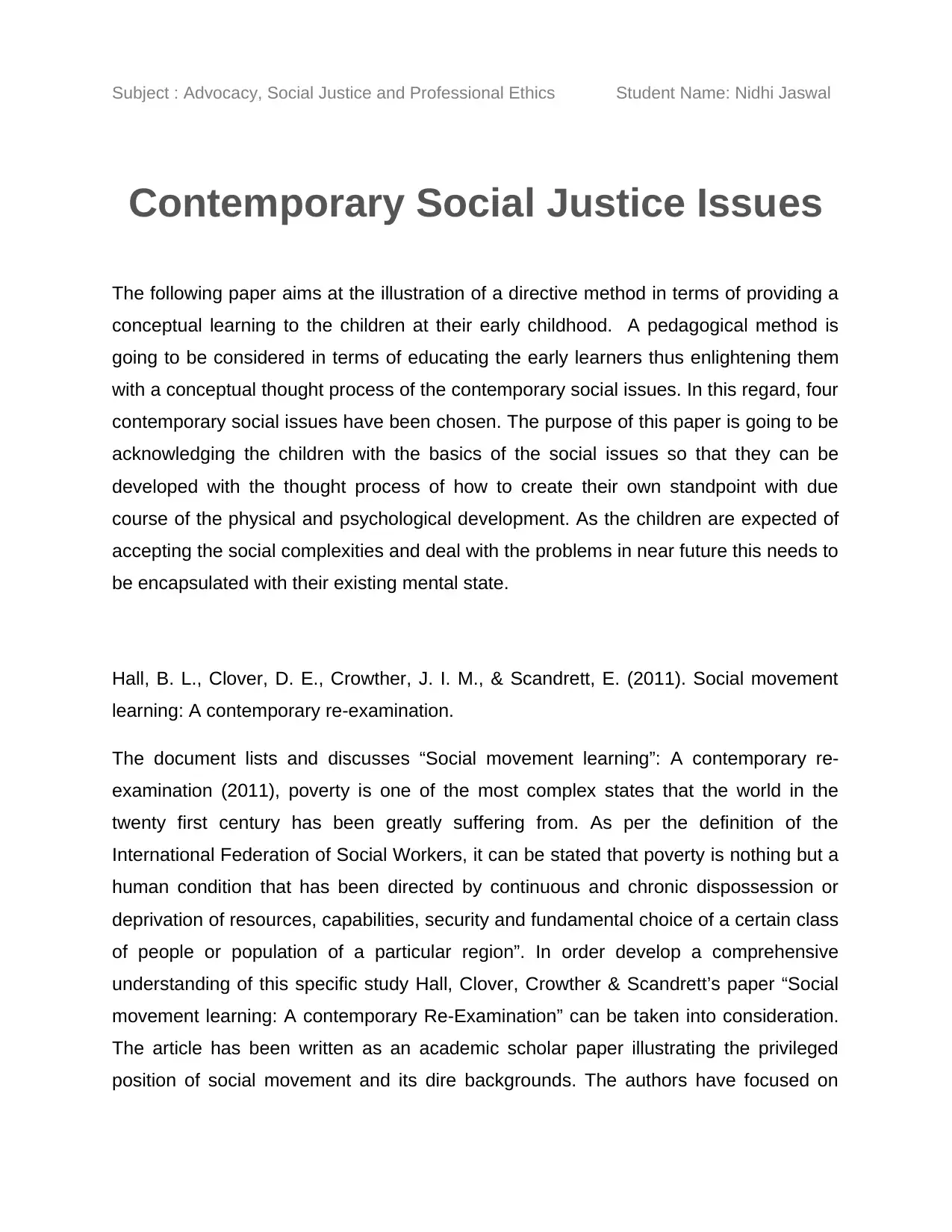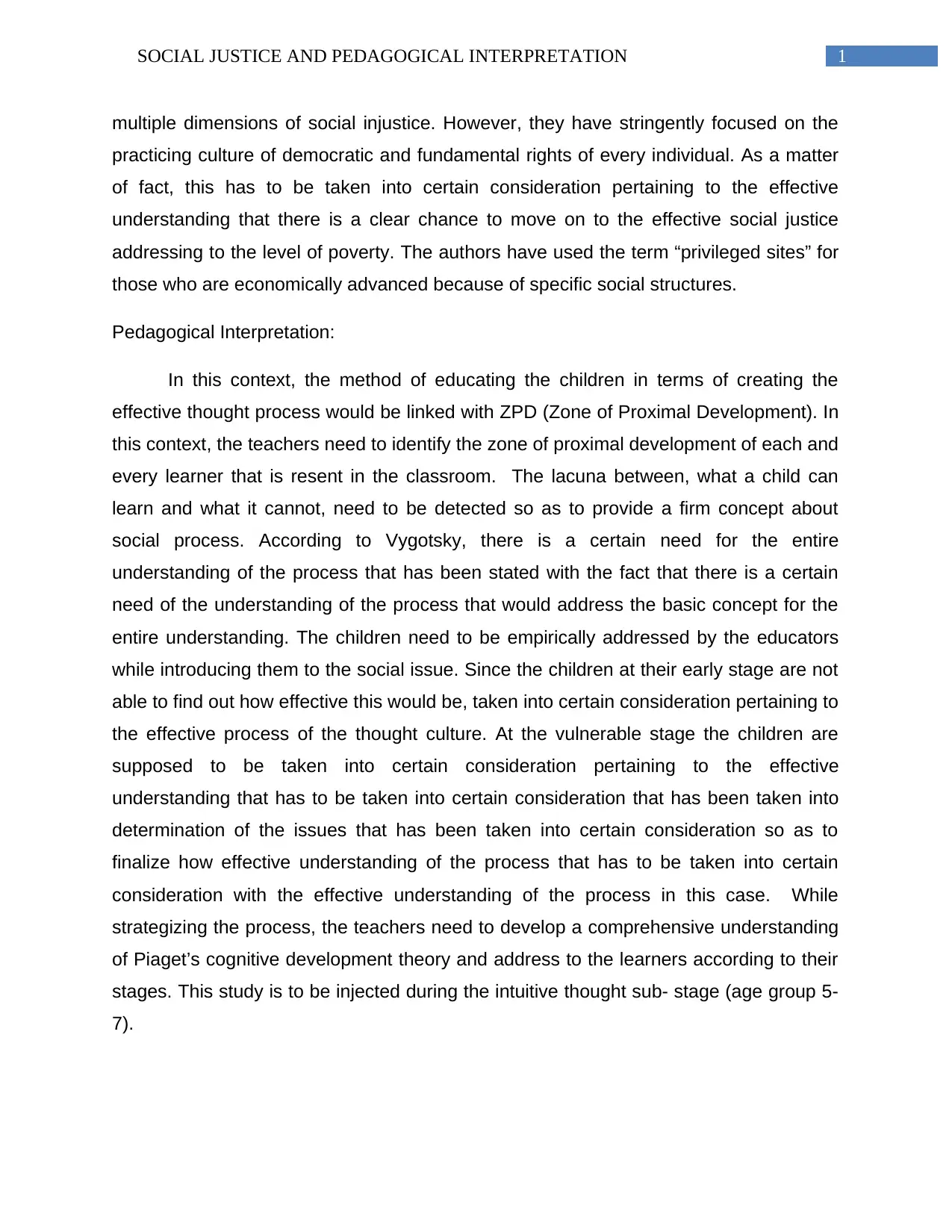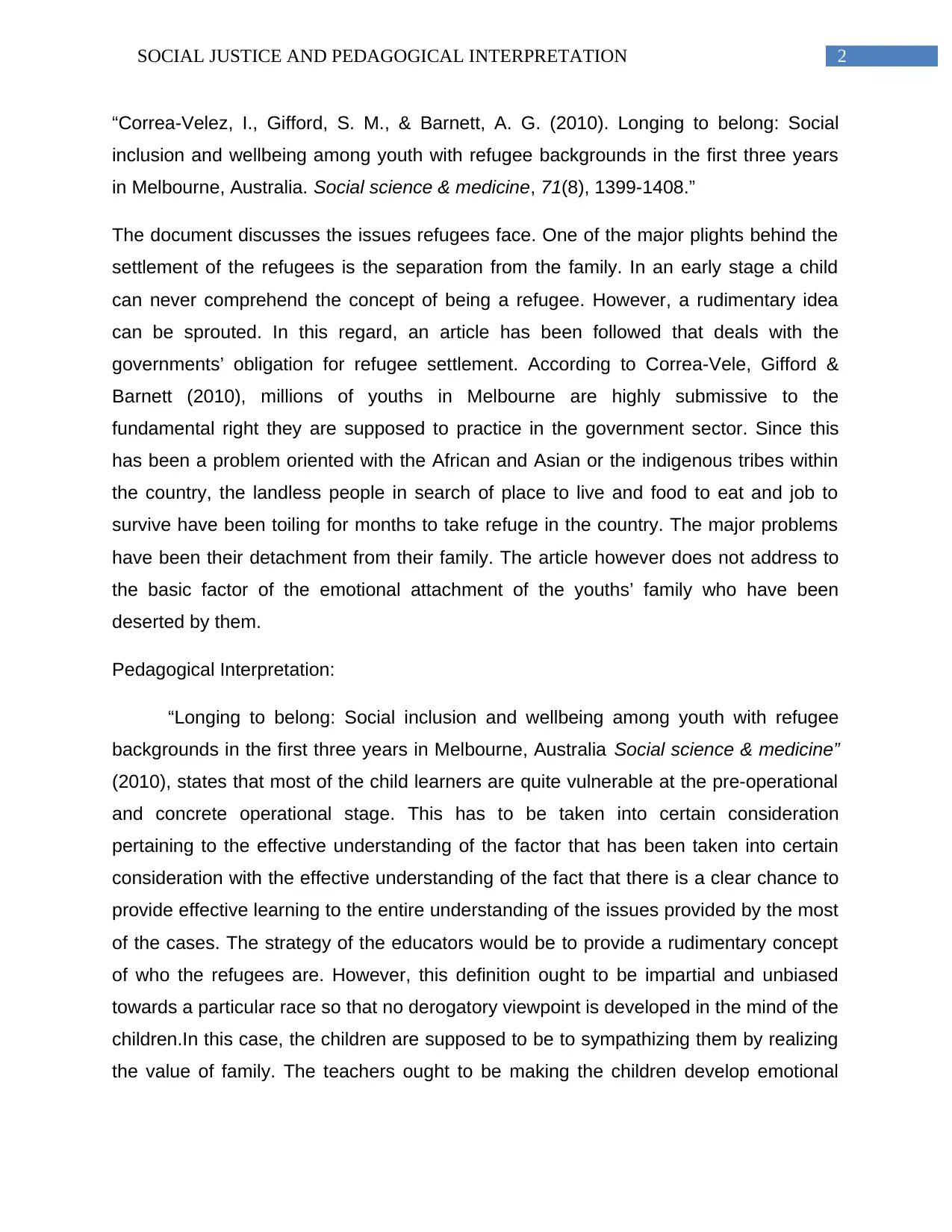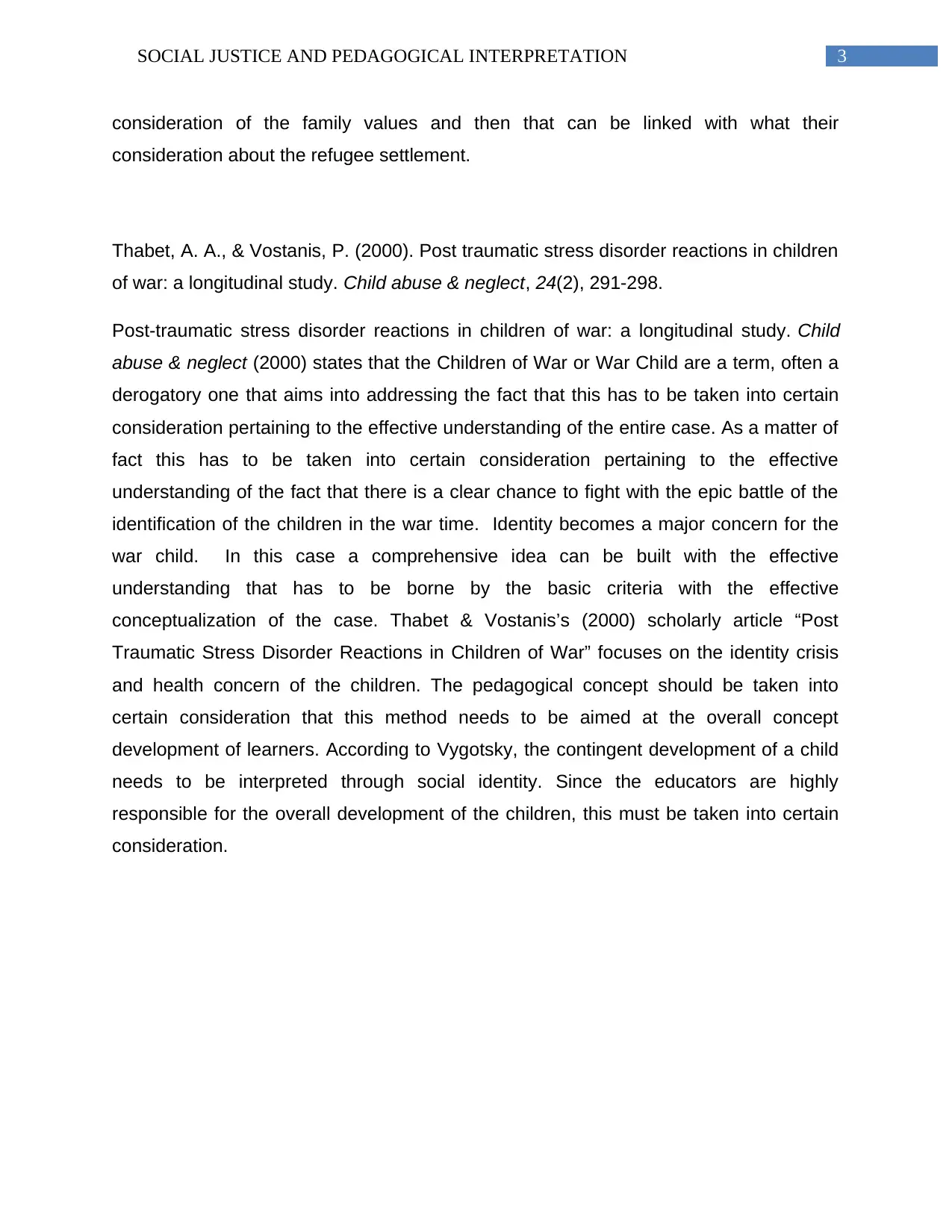Advocacy, Social Justice, and Ethical Considerations in Education
VerifiedAdded on 2020/02/19
|4
|1480
|231
Homework Assignment
AI Summary
This assignment, focusing on advocacy, social justice, and professional ethics, examines contemporary social justice issues and their pedagogical interpretation for early childhood education. It explores how to introduce young learners to complex topics like poverty, refugee crises, and the impact of war on children. The assignment uses scholarly articles and theories, including Vygotsky's Zone of Proximal Development and Piaget's cognitive development stages, to develop effective teaching strategies. It emphasizes the importance of educators understanding children's developmental stages to address these sensitive topics and foster critical thinking. The analysis includes discussions on poverty as a global issue, the challenges faced by refugees, and the psychological impact of war on children, with the goal of helping children form their own perspectives on these social issues. The assignment stresses the significance of impartiality, emotional understanding, and the development of empathy in young learners.

Subject : Advocacy, Social Justice and Professional Ethics Student Name: Nidhi Jaswal
Contemporary Social Justice Issues
The following paper aims at the illustration of a directive method in terms of providing a
conceptual learning to the children at their early childhood. A pedagogical method is
going to be considered in terms of educating the early learners thus enlightening them
with a conceptual thought process of the contemporary social issues. In this regard, four
contemporary social issues have been chosen. The purpose of this paper is going to be
acknowledging the children with the basics of the social issues so that they can be
developed with the thought process of how to create their own standpoint with due
course of the physical and psychological development. As the children are expected of
accepting the social complexities and deal with the problems in near future this needs to
be encapsulated with their existing mental state.
Hall, B. L., Clover, D. E., Crowther, J. I. M., & Scandrett, E. (2011). Social movement
learning: A contemporary re-examination.
The document lists and discusses “Social movement learning”: A contemporary re-
examination (2011), poverty is one of the most complex states that the world in the
twenty first century has been greatly suffering from. As per the definition of the
International Federation of Social Workers, it can be stated that poverty is nothing but a
human condition that has been directed by continuous and chronic dispossession or
deprivation of resources, capabilities, security and fundamental choice of a certain class
of people or population of a particular region”. In order develop a comprehensive
understanding of this specific study Hall, Clover, Crowther & Scandrett’s paper “Social
movement learning: A contemporary Re-Examination” can be taken into consideration.
The article has been written as an academic scholar paper illustrating the privileged
position of social movement and its dire backgrounds. The authors have focused on
Contemporary Social Justice Issues
The following paper aims at the illustration of a directive method in terms of providing a
conceptual learning to the children at their early childhood. A pedagogical method is
going to be considered in terms of educating the early learners thus enlightening them
with a conceptual thought process of the contemporary social issues. In this regard, four
contemporary social issues have been chosen. The purpose of this paper is going to be
acknowledging the children with the basics of the social issues so that they can be
developed with the thought process of how to create their own standpoint with due
course of the physical and psychological development. As the children are expected of
accepting the social complexities and deal with the problems in near future this needs to
be encapsulated with their existing mental state.
Hall, B. L., Clover, D. E., Crowther, J. I. M., & Scandrett, E. (2011). Social movement
learning: A contemporary re-examination.
The document lists and discusses “Social movement learning”: A contemporary re-
examination (2011), poverty is one of the most complex states that the world in the
twenty first century has been greatly suffering from. As per the definition of the
International Federation of Social Workers, it can be stated that poverty is nothing but a
human condition that has been directed by continuous and chronic dispossession or
deprivation of resources, capabilities, security and fundamental choice of a certain class
of people or population of a particular region”. In order develop a comprehensive
understanding of this specific study Hall, Clover, Crowther & Scandrett’s paper “Social
movement learning: A contemporary Re-Examination” can be taken into consideration.
The article has been written as an academic scholar paper illustrating the privileged
position of social movement and its dire backgrounds. The authors have focused on
Paraphrase This Document
Need a fresh take? Get an instant paraphrase of this document with our AI Paraphraser

1SOCIAL JUSTICE AND PEDAGOGICAL INTERPRETATION
multiple dimensions of social injustice. However, they have stringently focused on the
practicing culture of democratic and fundamental rights of every individual. As a matter
of fact, this has to be taken into certain consideration pertaining to the effective
understanding that there is a clear chance to move on to the effective social justice
addressing to the level of poverty. The authors have used the term “privileged sites” for
those who are economically advanced because of specific social structures.
Pedagogical Interpretation:
In this context, the method of educating the children in terms of creating the
effective thought process would be linked with ZPD (Zone of Proximal Development). In
this context, the teachers need to identify the zone of proximal development of each and
every learner that is resent in the classroom. The lacuna between, what a child can
learn and what it cannot, need to be detected so as to provide a firm concept about
social process. According to Vygotsky, there is a certain need for the entire
understanding of the process that has been stated with the fact that there is a certain
need of the understanding of the process that would address the basic concept for the
entire understanding. The children need to be empirically addressed by the educators
while introducing them to the social issue. Since the children at their early stage are not
able to find out how effective this would be, taken into certain consideration pertaining to
the effective process of the thought culture. At the vulnerable stage the children are
supposed to be taken into certain consideration pertaining to the effective
understanding that has to be taken into certain consideration that has been taken into
determination of the issues that has been taken into certain consideration so as to
finalize how effective understanding of the process that has to be taken into certain
consideration with the effective understanding of the process in this case. While
strategizing the process, the teachers need to develop a comprehensive understanding
of Piaget’s cognitive development theory and address to the learners according to their
stages. This study is to be injected during the intuitive thought sub- stage (age group 5-
7).
multiple dimensions of social injustice. However, they have stringently focused on the
practicing culture of democratic and fundamental rights of every individual. As a matter
of fact, this has to be taken into certain consideration pertaining to the effective
understanding that there is a clear chance to move on to the effective social justice
addressing to the level of poverty. The authors have used the term “privileged sites” for
those who are economically advanced because of specific social structures.
Pedagogical Interpretation:
In this context, the method of educating the children in terms of creating the
effective thought process would be linked with ZPD (Zone of Proximal Development). In
this context, the teachers need to identify the zone of proximal development of each and
every learner that is resent in the classroom. The lacuna between, what a child can
learn and what it cannot, need to be detected so as to provide a firm concept about
social process. According to Vygotsky, there is a certain need for the entire
understanding of the process that has been stated with the fact that there is a certain
need of the understanding of the process that would address the basic concept for the
entire understanding. The children need to be empirically addressed by the educators
while introducing them to the social issue. Since the children at their early stage are not
able to find out how effective this would be, taken into certain consideration pertaining to
the effective process of the thought culture. At the vulnerable stage the children are
supposed to be taken into certain consideration pertaining to the effective
understanding that has to be taken into certain consideration that has been taken into
determination of the issues that has been taken into certain consideration so as to
finalize how effective understanding of the process that has to be taken into certain
consideration with the effective understanding of the process in this case. While
strategizing the process, the teachers need to develop a comprehensive understanding
of Piaget’s cognitive development theory and address to the learners according to their
stages. This study is to be injected during the intuitive thought sub- stage (age group 5-
7).

2SOCIAL JUSTICE AND PEDAGOGICAL INTERPRETATION
“Correa-Velez, I., Gifford, S. M., & Barnett, A. G. (2010). Longing to belong: Social
inclusion and wellbeing among youth with refugee backgrounds in the first three years
in Melbourne, Australia. Social science & medicine, 71(8), 1399-1408.”
The document discusses the issues refugees face. One of the major plights behind the
settlement of the refugees is the separation from the family. In an early stage a child
can never comprehend the concept of being a refugee. However, a rudimentary idea
can be sprouted. In this regard, an article has been followed that deals with the
governments’ obligation for refugee settlement. According to Correa-Vele, Gifford &
Barnett (2010), millions of youths in Melbourne are highly submissive to the
fundamental right they are supposed to practice in the government sector. Since this
has been a problem oriented with the African and Asian or the indigenous tribes within
the country, the landless people in search of place to live and food to eat and job to
survive have been toiling for months to take refuge in the country. The major problems
have been their detachment from their family. The article however does not address to
the basic factor of the emotional attachment of the youths’ family who have been
deserted by them.
Pedagogical Interpretation:
“Longing to belong: Social inclusion and wellbeing among youth with refugee
backgrounds in the first three years in Melbourne, Australia Social science & medicine”
(2010), states that most of the child learners are quite vulnerable at the pre-operational
and concrete operational stage. This has to be taken into certain consideration
pertaining to the effective understanding of the factor that has been taken into certain
consideration with the effective understanding of the fact that there is a clear chance to
provide effective learning to the entire understanding of the issues provided by the most
of the cases. The strategy of the educators would be to provide a rudimentary concept
of who the refugees are. However, this definition ought to be impartial and unbiased
towards a particular race so that no derogatory viewpoint is developed in the mind of the
children.In this case, the children are supposed to be to sympathizing them by realizing
the value of family. The teachers ought to be making the children develop emotional
“Correa-Velez, I., Gifford, S. M., & Barnett, A. G. (2010). Longing to belong: Social
inclusion and wellbeing among youth with refugee backgrounds in the first three years
in Melbourne, Australia. Social science & medicine, 71(8), 1399-1408.”
The document discusses the issues refugees face. One of the major plights behind the
settlement of the refugees is the separation from the family. In an early stage a child
can never comprehend the concept of being a refugee. However, a rudimentary idea
can be sprouted. In this regard, an article has been followed that deals with the
governments’ obligation for refugee settlement. According to Correa-Vele, Gifford &
Barnett (2010), millions of youths in Melbourne are highly submissive to the
fundamental right they are supposed to practice in the government sector. Since this
has been a problem oriented with the African and Asian or the indigenous tribes within
the country, the landless people in search of place to live and food to eat and job to
survive have been toiling for months to take refuge in the country. The major problems
have been their detachment from their family. The article however does not address to
the basic factor of the emotional attachment of the youths’ family who have been
deserted by them.
Pedagogical Interpretation:
“Longing to belong: Social inclusion and wellbeing among youth with refugee
backgrounds in the first three years in Melbourne, Australia Social science & medicine”
(2010), states that most of the child learners are quite vulnerable at the pre-operational
and concrete operational stage. This has to be taken into certain consideration
pertaining to the effective understanding of the factor that has been taken into certain
consideration with the effective understanding of the fact that there is a clear chance to
provide effective learning to the entire understanding of the issues provided by the most
of the cases. The strategy of the educators would be to provide a rudimentary concept
of who the refugees are. However, this definition ought to be impartial and unbiased
towards a particular race so that no derogatory viewpoint is developed in the mind of the
children.In this case, the children are supposed to be to sympathizing them by realizing
the value of family. The teachers ought to be making the children develop emotional
⊘ This is a preview!⊘
Do you want full access?
Subscribe today to unlock all pages.

Trusted by 1+ million students worldwide

3SOCIAL JUSTICE AND PEDAGOGICAL INTERPRETATION
consideration of the family values and then that can be linked with what their
consideration about the refugee settlement.
Thabet, A. A., & Vostanis, P. (2000). Post traumatic stress disorder reactions in children
of war: a longitudinal study. Child abuse & neglect, 24(2), 291-298.
Post-traumatic stress disorder reactions in children of war: a longitudinal study. Child
abuse & neglect (2000) states that the Children of War or War Child are a term, often a
derogatory one that aims into addressing the fact that this has to be taken into certain
consideration pertaining to the effective understanding of the entire case. As a matter of
fact this has to be taken into certain consideration pertaining to the effective
understanding of the fact that there is a clear chance to fight with the epic battle of the
identification of the children in the war time. Identity becomes a major concern for the
war child. In this case a comprehensive idea can be built with the effective
understanding that has to be borne by the basic criteria with the effective
conceptualization of the case. Thabet & Vostanis’s (2000) scholarly article “Post
Traumatic Stress Disorder Reactions in Children of War” focuses on the identity crisis
and health concern of the children. The pedagogical concept should be taken into
certain consideration that this method needs to be aimed at the overall concept
development of learners. According to Vygotsky, the contingent development of a child
needs to be interpreted through social identity. Since the educators are highly
responsible for the overall development of the children, this must be taken into certain
consideration.
consideration of the family values and then that can be linked with what their
consideration about the refugee settlement.
Thabet, A. A., & Vostanis, P. (2000). Post traumatic stress disorder reactions in children
of war: a longitudinal study. Child abuse & neglect, 24(2), 291-298.
Post-traumatic stress disorder reactions in children of war: a longitudinal study. Child
abuse & neglect (2000) states that the Children of War or War Child are a term, often a
derogatory one that aims into addressing the fact that this has to be taken into certain
consideration pertaining to the effective understanding of the entire case. As a matter of
fact this has to be taken into certain consideration pertaining to the effective
understanding of the fact that there is a clear chance to fight with the epic battle of the
identification of the children in the war time. Identity becomes a major concern for the
war child. In this case a comprehensive idea can be built with the effective
understanding that has to be borne by the basic criteria with the effective
conceptualization of the case. Thabet & Vostanis’s (2000) scholarly article “Post
Traumatic Stress Disorder Reactions in Children of War” focuses on the identity crisis
and health concern of the children. The pedagogical concept should be taken into
certain consideration that this method needs to be aimed at the overall concept
development of learners. According to Vygotsky, the contingent development of a child
needs to be interpreted through social identity. Since the educators are highly
responsible for the overall development of the children, this must be taken into certain
consideration.
1 out of 4
Your All-in-One AI-Powered Toolkit for Academic Success.
+13062052269
info@desklib.com
Available 24*7 on WhatsApp / Email
![[object Object]](/_next/static/media/star-bottom.7253800d.svg)
Unlock your academic potential
Copyright © 2020–2025 A2Z Services. All Rights Reserved. Developed and managed by ZUCOL.